Timing & trends
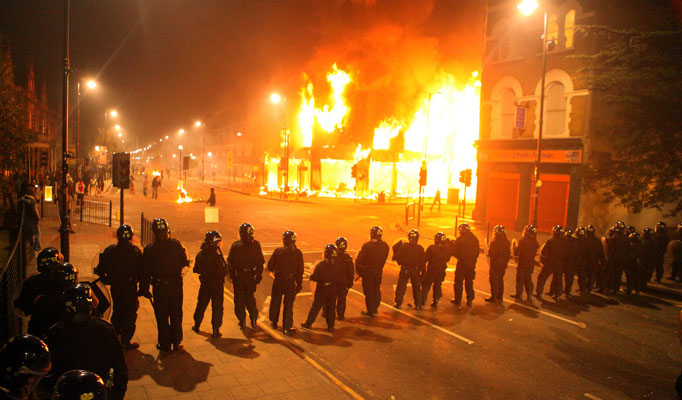 With the world in crisis, my email inbox is flooded. Especially so, since over four years ago, I forecast a period of rising domestic and international geopolitical tension, violence and even war.
With the world in crisis, my email inbox is flooded. Especially so, since over four years ago, I forecast a period of rising domestic and international geopolitical tension, violence and even war.
At the time, almost no one believed me. They even laughed. I even told them the Federal Reserve and other central banks would be meaningless going forward. As would interest rates. Everybody — and I mean everybody — thought I was nuts.
Even more so, when I told everyone that the geopolitical tensions would end up sending the Dow Industrials to new record highs near 31,000.
Well now, no one is laughing. To the contrary. The world, including the U.S., is crying. And now, everyone is asking me, “What the heck is going on?”
It’s not like I didn’t warn you. I warned you repeatedly starting in 2013 that the world would be breaking apart at the seams. That there would be new wars and new terrorist groups in the Middle East. And that the European Union would start to break apart like an eggshell.
And that, yes, major protests and divisiveness would even come to our own country.
What is this phenomenon that is driving such divisiveness in today’s world?
It’s the accumulation of deficit spending, poor corporate governance, poor political leadership, ignorance and more from the leaders of the world.
It’s all coming to a head through the cycles of war that I have previously written about. Those cycles do not crest until late 2020/early 2021.
Between now and then, you can expect more of what you have recently seen. More terrorist attacks in Europe and the United States. More domestic unrest on both continents. More political unrest. And ultimately, the entire collapse of the European Union.
The U.S. will fare better. It will have its terrorist attacks and its domestic unrest. And to be sure, a whole new set of crazy, insane leaders ignorant of history and how these things work.
But of all the places in the world, we will still be the prettiest, and capital will be attracted to our markets, especially the stock market.
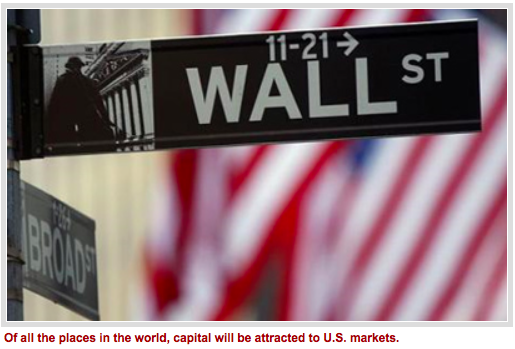
So in the months and years ahead, when you see the world falling apart around you, don’t automatically assume the dollar will crash and so will the U.S stock market.
No. As bad as it will get here, from the rest of the world’s perspective, the U.S. will still be an island of safety for capital.
Get used to it. It will change everything you know. It will change everything you thought about economics. It will change everything you thought you knew about investing.
Accept it and you will protect and grow your money like never before. Ignore it and you will lose almost everything.
Best wishes and stay safe,
Larry
related:

The stock market has hit a lot of records lately: all-time highs for the Dow Jones Industrial Average and for the S&P 500, with even the bond market making history (record-high prices and record-low yields).
With the Dow closing higher on Wednesday, stocks just did something else historic, according to Nautilus Investment Research.
“We highlight two momentum signals we will be watching today,” Nautilus’ Tom Leveroni wrote in a note earlier on Wednesday. “An up close in the Dow Industrials today will give it 9 consecutive up closes, a rare feat of trend persistence.”
The Dow hit the ninth up day in a row — only the seventh time this has happened since 1980. In each of the other six instances, albeit on a small sample size, the index has been up the following six months with an average gain of 10.41%.
The largest of these upward moves was 22.05% after the market hit the streak on January 14, 1987, and the smallest was a 4.72% gain in the six months after it was hit on New Year’s Eve 1991.
Additionally, according to Leveroni, this is the 30th time this has happened since 1900, and the average gain in the following six months has been 5.96%.
So here’s to another record.
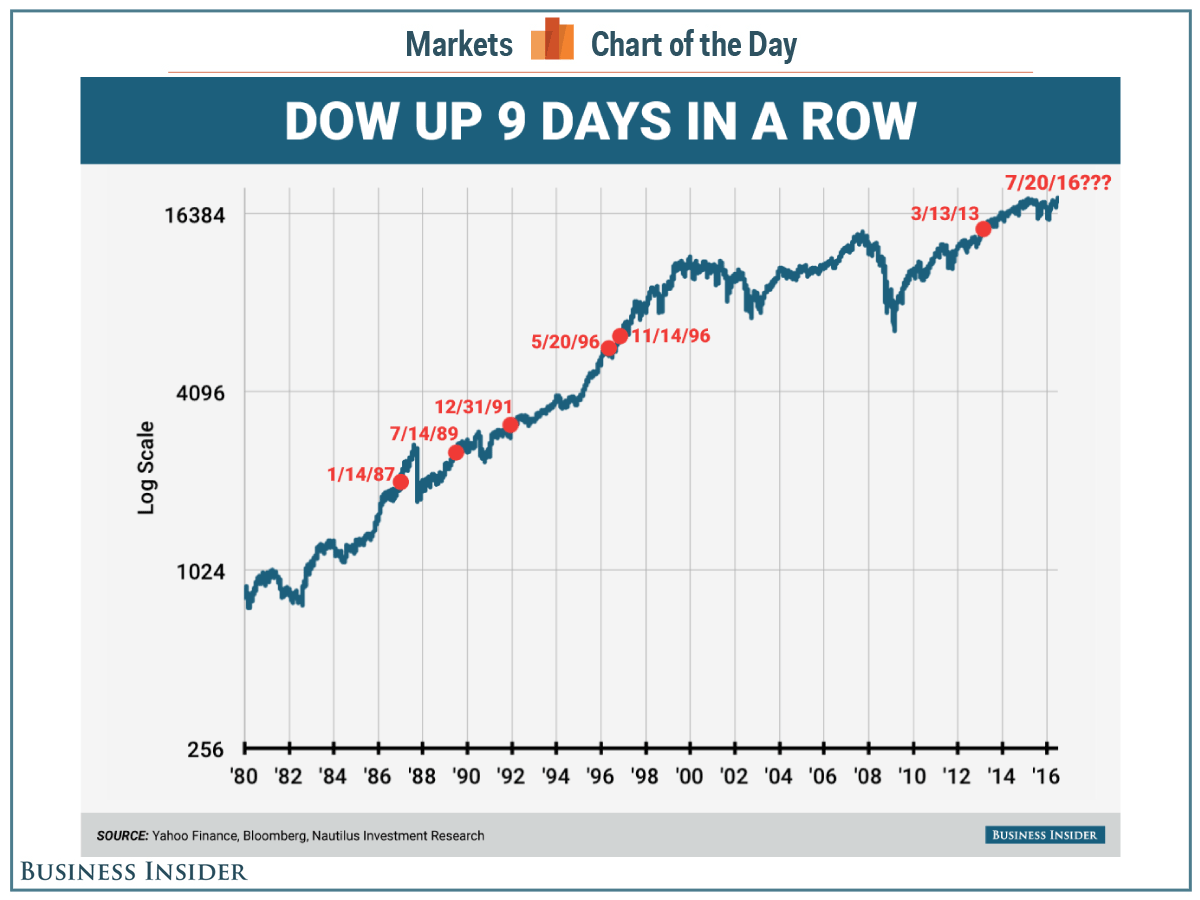
related:
Michael Campbell’s Mid-Week Update: The Capital Flood & All-Time Stock Market Highs


Traders work at their desks in front of the German share price index, DAX board, at the stock exchange in Frankfurt, Germany, July 20, 2016.
World stocks faded after hitting nine-month highs on Thursday, cooled by signals from Japan that its next shot of stimulus won’t include hand-out ‘helicopter money’.
The European Central Bank, at its first post-Brexit meeting, opted to keep its record low interest rates on hold and Wall Street markets looked to be heading for a subdued restart.
There were roller coaster moves for the yen in the currency markets. It fell to a six-week low on reports of a 20 trillion plus yen Japanese stimulus package only to bolt up as Bank of Japan chief Haruhiko Kuroda shot down talk of the extreme “helicopter money” option — effectively giving cash directly to the population — in a BBC radio interview.
Europe’s main bourses had turned lower as the news compounded what had already been a subdued start after warnings of poor bookings from Lufthansa (LHAG.DE) and easyJet (EZJ.L) had sent airline stocks tumbling. .SXTP
The German firm dropped over 7 percent as it said bookings had been hit hard by the recent “terrorist attacks in Europe and greater political and economic uncertainty,” mainly meaning Britain’s vote to leave the European Union.
It left the pan-regional FTSEurofirst 300 .FTEU3 down 0.5 percent and dragged MSCI’s 46-country All-World share index .MIWD00000PUS back towards the red after it had hit its highest level since early November in Asia.
Focus then turned to the ECB’s meeting in Frankfurt and its list of concerns including the impact of Brexit, a potential Italian banking crisis and suggestions the central bank itself is running out of policy ammunition.
Having held its rates, Mario Draghi used a news conference to stress the bank was committed to its 80 billion euros ($88 billion) a month stimulus programme and would use “all available instruments,” if things took another turn for the worse.
It left the euro a touch higher at $1.1060 EUR= having fallen for 10 of the last 14 weeks, while German DE10YT=TWEB and other core euro zone government bond yields nudged up to their highest levels of the month so far. [GVD/EUR]
“This month is all about central banks sitting on their hands and the ECB is no exception,” said Aberdeen Asset Management’s Luke Hickmore.
“They are waiting for some hard economic data to indicate what harm the UK’s referendum might have on euro zone growth.”
Turkish assets struggled again after President Tayyip Erdogan declared a state of emergency on Wednesday, widening a crackdown against thousands of members of the security forces, judiciary, civil service and academia after Friday’s failed military coup.
Istanbul’s main stock market slumped 3.3 percent .XU100 in a fourth day of falls, although the lira TRY= managed to claw back 0.25 percent after plunging below the big figure of 3 per dollar.
Turkey apart, emerging markets are on a hot streak. Inflows to EM assets hit their highest level in nearly three years last week, according to the latest survey by the Institute of International Finance.
For Reuters new Live Markets blog on European and UK stock markets see reuters://realtime/verb=Open/url=http://emea1.apps.cp.extranet.thomsonreuters.biz/cms/?pageId=livemarkets
BIG IN JAPAN
Futures prices ESc1 pointed to a steady start for record high Wall Street markets .SPX.DJIwhen they resume later having already received some mixed Philly Fed data. ECONG&
Overnight, MSCI’s broadest index of Asia-Pacific shares outside Japan .MIAPJ0000PUS had risen to its highest level since October 2015, taking gains over the last month past 10 percent in the process.
Japan’s Nikkei stock index .N225 outperformed as it rose 1 percent on reports that the government is to compile a stimulus package of at least 20 trillion yen to help the economy.
“What the market wants now is both fiscal and monetary policy and such expectations are getting higher,” said Hikaru Sato, a senior technical analyst at Daiwa Securities.
Having been as low as 107.46 to the dollar, the yen was spurred right back up to 105.71 by Kuroda’s comments in a BBC radio interview when he said: “I don’t think at this stage we should abandon this intuitional setting. No need and no possibility for helicopter money.”
The dollar index, which tracks a basket of six main world currencies, dipped to 96.870 .DXY having touched 97.323, its highest level since early March, on Wednesday.
In commodity markets, oil was beginning to wobble again. Brent crude LCOc1 nudged back towards $47 a barrel having been as high as $47.35 in Asia, while U.S. crude CLc1 was a touch higher at $45.84 a barrel.
The more uncertain hue gave a boost to safe-haven gold XAU=, which edged up 0.3 percent to $1,320 an ounce after plumbing three-week lows on Wednesday. U.S. government bond yields ticked lower to 1.5732 percent US10YT=RR following a near 20 percent rise since the start of the month.
“With gold looking increasingly shaky on the charts, all eyes will turn to the ECB policy meeting,” said INTL FCStone analyst Edward Meir.
“Should the central bank signal a more accommodative policy, we could see gold get a bit of a lift despite the fact that the dollar could strengthen as a result.”
($1 = 0.9076 euros)
(Addition reporting by Saikat Chatterjee in Hong Kong, Vijaykumar Vedala in Bengaluru; Editing by Catherine Evans/Ruth Pitchford)
related:
Technically Speaking: Pushing Extremes

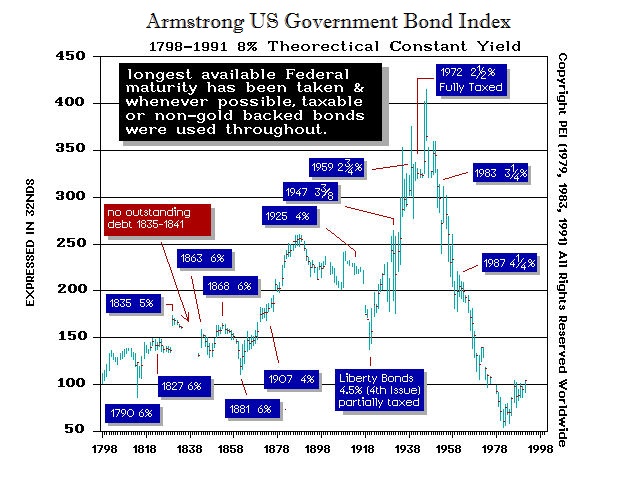
(Note: The blue labels mark the change in the issues we used to create this perpetual index for long bonds)
Germany sold 10-year debt at a negative yield on Wednesday of last week, becoming the first Eurozone nation to do so and setting a further milestone in the relentless fall of government bond yields around the world. However, there is a real crisis brewing. Bonds with negative yields, which are now about one-third of the bonds in Europe, are NOT eligible for the ECB to purchase in its program. This means that when the sentiment changes, the bonds will crash unbelievably.
This is similar to the US bonds during World War II when the government ordered the central bank to support the government bonds at par. When that directive ended in 1951, the bond market crashed. This is what awaits us, for even the ECB cannot buy negative yielding bonds. Right now, the negative yield on 10-year German bonds is actually a bet against the euro as players are betting that the euro will collapse and they will end up with Deutsche marks once again.
related:

For an example of how far we’ve fallen from the old days of free-range First World entitlement, consider the fact that investment analysts are now judging companies by how well they cater to the needs of the terrified:
Papa John’s upgraded on belief civil unrest is encouraging more pizza delivery
(MarketWatch) – Papa John’s International Inc. was upgraded to overweight from sector weight at KeyBanc Capital Markets with analysts expressing the surprising view that diners, concerned about political and civil unrest, are choosing to stay home for pizza delivery rather than head out for a meal.
“After speaking with several large operators and industry contacts, we believe the recent decline in casual dining restaurant segment fundamentals — traffic down 3% to 5% the past several weeks — may be the result of consumers eating more at home amid the current political/social backdrop, which we believe could last through the November election,” KeyBanc analysts wrote in a note published Tuesday.
Diners’ shift to a preference for convenience will benefit pizza delivery businesses like Papa John’s, according to KeyBanc.
Papa John’s shares, which jumped 3.8% Wednesday, are up 23.0% over the past three months. The S&P 500 is up 2.9% for the last three months.
This kind of mirco-fear is, not surprisingly, reflected in macro trends like defense stocks, which are now analyst favorites:
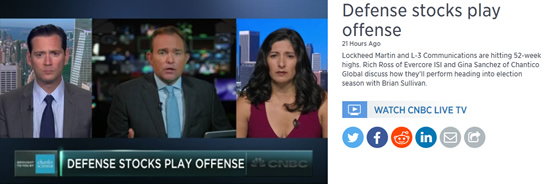
And of course gold and silver are always key parts of the chaos story. If we can’t trust the big systems to function safely or efficiently, and the biggest systems of all are fiat currency and fractional reserve banking, then opting out of paper money begins to make sense. Hence the monster run in precious metals miners during the first half of the year:
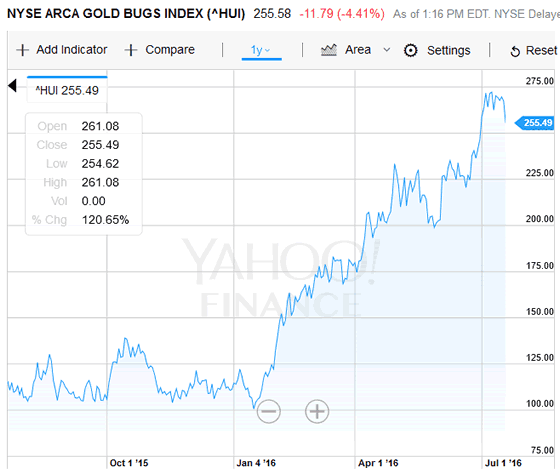
This breakdown of global civilization seems to baffle mainstream economists, leading to more or less random predictions:
IMF Called “Clowns” After Admitting They Fabricated Brexit Doom And Gloom
(Zero Hedge) – “The IMF has serious credibility problems. It has been seriously wrong for years. I hope that one of the things that the new government does is push to have some credible people running this institution… rather than the clowns currently running it,” exclaimed UKIP MP Douglas Carswell, pointing out Lagarde’s legion of fools flip-flop that the British economy will grow faster than Germany and France in the next two years – only weeks after its doom-laden warnings about Brexit.
As The Daily Mail reports, after saying that leaving the European Union could trigger a UK recession, the International Monetary Fund now expects the British economy to grow by 1.7 per cent this year and 1.3 per cent next year.
That is weaker than the 1.9 and 2.2 per cent growth forecasts before the referendum, but the UK is still set to be the second-fastest growing economy in the Group of Seven industrialised nations this year – behind the United States – and third-fastest next year, behind the US and Canada.
Of course, this is not the first time The IMF has unleashed comedic genius on the world…
But the new UK forecasts represent a climbdown for the global financial watchdog after it issued a string of doom-laden warnings over the damage Brexit would do.
Ahead of the referendum, IMF managing director Christine Lagarde, an ally of former chancellor George Osborne, said Brexit would be ‘pretty bad, to very, very bad’ for the UK.
But the latest forecasts – and an admission that a recession is now unlikely – suggest the outlook is not as bleak as the watchdog claimed.
And again, as The Mail notes, it is not the first time the IMF has had to row back from damaging comments about the UK economy. In April 2013, the fund’s then chief economist Olivier Blanchard said Britain was ‘playing with fire’ by pressing ahead with austerity at a time of ‘very low growth’. But the IMF was quickly forced into a dramatic volte face as the UK economy sprang into life, forcing Mrs Lagarde to admit ‘we got it wrong’.
The IMF’s new chief economist Maury Obstfeld said yesterday there were ‘promising signs’ for the global economy in the first half of 2016, but added: ‘Brexit has thrown a spanner in the works.’
And finally, here’s a short excerpt from a longer, must-read article titled The world is taking its revenge against elites. When will America’s wake up? by Thomas Frank, whose provocative work has been, um, discussed on DollarCollapse.com for many years.
The world of accepted ideas was coming apart, and no one caught the new mood better than the New York Times’s David Brooks, a man who has spent his career describing the inner lives of the nation’s prosperous white-collar elite. Ordinarily a dealer in witty aphorisms and upper-crust humor, Brooks now wrote a column entitled “Are We On the Path to National Ruin?” in which he speculated darkly about the possibility of fascism in America. “The crack of some abyss opened up for a moment by the end of last week,” he wrote. “It’s very easy to see this country on a nightmare trajectory.”
Brooks-in-despair is a pitiful sight, and one can’t help but sympathize. But what’s really remarkable about the response to these shocks of people like him has been their inability to acknowledge that their own satisfied white-collar class might be part of the problem. On this they are utterly in denial and whatever the disaster, the answer they give is always … more of the same. More “innovation”. More venture capital. More sharp young global Stanford entrepreneurs. There is no problem that more people like they themselves can’t solve.
It’s easy to see the problems presented by a cliquish elite when they happen elsewhere. In the countries of Old Europe, maybe, powerful politicians sell out grotesquely to Goldman Sachs; but when an idealistic American president announces that he wants to seek a career in venture capital, we have trouble saying much of anything. In Britain, maybe, they have an “establishment”; but what we have in America, we think, are talented people who deserve to be on top. One wonders what kind of a shock it will take to shake us out of this meritocratic complacency once and for all.
It’s important to understand that all of this, while seemingly coming out of left field for mainstream economists and politicians, was completely predictable for both Austrian School economists (who focus on a society’s balance sheet rather than irrelevancies like money supply or aggregate demand, and correctly see rising leverage as a sign of trouble) and pretty much anyone else with simple common sense.
It’s actually fairly simple: When you borrow too much money your life spins out of control. Individuals, families, and societies all live under the same set of economic laws, and suffer similar penalties for violating them.
The fact that this bit of kitchen-table wisdom is not apparent to the people in charge just reinforces the impression that they’re completely clueless, which in turn elevates the fear that the average person experiences when police are systematically killed and random assemblages are attacked with weapons ranging from assault rifles to tractor/trailers to axes. Or when interest rates fall to the point that retirement savings earn literally nothing while assets with unacceptable levels of risk (junk bonds, growth stocks, leveraged ETFs) are making fortunes for speculators.
Since the process of hyper-leveraging the world is shifting into an even higher gear as this is written, expect the mainstream to be surprised again – and regular people to even more terrified — by the result. Which means our future will include even more gold, missiles and pizza.
related:
Don’t miss Michael’s Mid-Week Update: The Capital Flood & All-Time Stock Market Highs













